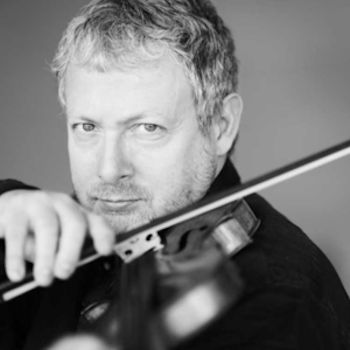Recording of the Week,
Vivaldi's Argippo from Fabio Biondi and Europa Galante
You can always rely on Naïve’s enterprising Vivaldi Edition to deliver the goods at a time of year when new releases are generally thin on the ground, and today brings a superb account of Argippo, a pasticcio from the early 1730s which incorporates music by composers including Hasse, Porpora and Galeazzi as well as the Red Priest himself.
 To say that the plot hasn’t aged well is putting it mildly. Zanaida, daughter of Gran Mogol Tisifaro, has apparently ‘yielded her honour’ under cover of darkness to king Argippo, which makes his state visit to her father’s court with his new wife Osira more than slightly awkward. (The reality is that Zanaida’s nocturnal visitor was in fact the nefarious courtier Silvero, who has previously failed to win her over on his own terms and decided that a spot of identity-theft might be worth a shot). Asked to pass judgement on a hypothetical situation in which a man seduces one woman before marrying another, Argippo declares that the only course of action is for the guilty party to murder his spouse and return to his previous lover, nobly agreeing to put his money where his mouth is when he himself is accused of the offence. Silvero eventually comes clean in the nick of time, a revelation which Zanaida greets with baffling sang-froid: declaring that it was obviously Meant To Be, she happily agrees to marry him and the curtain falls to general rejoicing. It would be a bold stage-director indeed who took this one on today.
To say that the plot hasn’t aged well is putting it mildly. Zanaida, daughter of Gran Mogol Tisifaro, has apparently ‘yielded her honour’ under cover of darkness to king Argippo, which makes his state visit to her father’s court with his new wife Osira more than slightly awkward. (The reality is that Zanaida’s nocturnal visitor was in fact the nefarious courtier Silvero, who has previously failed to win her over on his own terms and decided that a spot of identity-theft might be worth a shot). Asked to pass judgement on a hypothetical situation in which a man seduces one woman before marrying another, Argippo declares that the only course of action is for the guilty party to murder his spouse and return to his previous lover, nobly agreeing to put his money where his mouth is when he himself is accused of the offence. Silvero eventually comes clean in the nick of time, a revelation which Zanaida greets with baffling sang-froid: declaring that it was obviously Meant To Be, she happily agrees to marry him and the curtain falls to general rejoicing. It would be a bold stage-director indeed who took this one on today.
The scenario provides ample opportunity for ornate reflections on love and duty for everyone concerned, often via metaphors involving storm-tossed ships, guiding stars and turtledoves, and all five singers cover themselves in glory. Though the title-character is naturally assigned several show-stopping arias, it’s Zanaida who is the beating heart of the opera, and Galou brings her to life in all her emotional complexity: the role sits squarely in soprano territory, but the French contralto has no shortage of colours in her middle and upper registers and exploits every one of them to full effect, making particularly striking use of straight tone in her second-act aria ‘Io son rea’ and wringing maximum drama from the rather uninspired secco recitatives (almost certainly the work of an assistant rather than Vivaldi himself). Her first aria ‘Se lento ancora il fulmine’ (which made for a scintillating opener on Cecilia Bartoli’s Vivaldi album a couple of years ago) is a real tour de force, and indeed there’s something of Bartoli’s manic energy to Galou’s singing throughout, though the voice is considerably fuller and the coloratura notably less mechanical.
 The other stand-out performance comes from the young Swiss soprano Marie Lys, who endows the potentially thankless role of Osira with true pathos and is especially compelling in Andrea Stefano Fiorè’s ‘Vado a morire per te’, which showcases her lovely liquid legato to perfection. Emőke Baráth’s edgier sound in the title-role falls less gratefully on the ear for me, though she impresses in the stratospheric bravura of Galeazzi’s ‘Anche in mezzo a perigliosa’ and the contrast between the two sopranos comes in handy in an opera dominated by upper voices. Marianna Pizzolato’s warm mezzo renders Silvero far more sympathetic than he deserves; like Handel’s Polinesso, this ‘smiling, damnèd villain’ executes his treachery in the courtliest of musical language, and Pizzolato does it all with consummate elegance. Her remorseful ‘Se la bella tortorella’, with Biondi exuding easy virtuosity in the lovely violin obbligato, is one of the highlights of the set and put me a little in mind of ‘Se in fiorito’ from Handel’s Giulio Cesare some eight years earlier.
The other stand-out performance comes from the young Swiss soprano Marie Lys, who endows the potentially thankless role of Osira with true pathos and is especially compelling in Andrea Stefano Fiorè’s ‘Vado a morire per te’, which showcases her lovely liquid legato to perfection. Emőke Baráth’s edgier sound in the title-role falls less gratefully on the ear for me, though she impresses in the stratospheric bravura of Galeazzi’s ‘Anche in mezzo a perigliosa’ and the contrast between the two sopranos comes in handy in an opera dominated by upper voices. Marianna Pizzolato’s warm mezzo renders Silvero far more sympathetic than he deserves; like Handel’s Polinesso, this ‘smiling, damnèd villain’ executes his treachery in the courtliest of musical language, and Pizzolato does it all with consummate elegance. Her remorseful ‘Se la bella tortorella’, with Biondi exuding easy virtuosity in the lovely violin obbligato, is one of the highlights of the set and put me a little in mind of ‘Se in fiorito’ from Handel’s Giulio Cesare some eight years earlier.
Biondi’s energetic, imaginative direction is of course key to the success of the entire project, bringing real coherence to a work which could easily seem like Now That’s What I Call Music 1732: even the most pedestrian recitatives have drive and dramatic impetus, and he summons such an impressive range of colours from the small band that I was well into the third act before I registered that the work is scored for strings and continuo only. It’s another triumph for Naïve’s pioneering series, and for Galou and Biondi in particular.
Emőke Baráth (Argippo), Delphine Galou (Zanaida), Marie Lys (Osira), Marianna Pizzolato (Silvero), Luigi De Donato (Tisifaro)
Europa Galante, Fabio Biondi
Available Formats: 2 CDs, MP3, FLAC, Hi-Res FLAC



